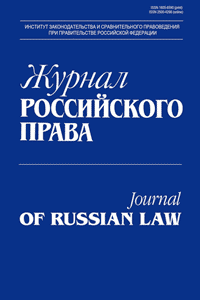The article considers some positive features of the independent deputy mandate conception and notes some of its shortcomings. For the purpose of analysis of the legal nature of a deputy mandate, the author considers it necessary to identify three interconnected legal relations where a deputy has different legal statuses and different rights, obligations and responsibilities. In a lasting legal relation with the electorate the deputy acts as their representative, in the legal relation with the party that has nominated him, he is a representative of this party, and in the legal relation with the people of the Russian Federation (their portion) he is a representative of these people (their portion) who should express their will in the adopted decisions as part of the relevant representative body. There are some imperative elements in the lasting electoral legal relations, but in his relations with the people of the Russian Federation (their portion) there prevail some features of the independent mandate. According to the author, all these legal relations are active pattern relations whose active centre is in the deputy’s obligations directly related to the interests of the representees and their relevant right to demand to observe them and bring the deputy to responsibility when these obligations are not performed. These features of a deputy mandate suggest a binding, imperative model of legal regulation at the heart of which there should be legal obligation and subsequent legal responsibility. At the present time, based on the prevailing interpretation of the independent mandate, in order to regulate the deputy’s constitutional-legal status, another permissible, dispositive model of legal regulation is applied, that allows for the deputy to act at his discretion. In this context the article justifies the necessity of the Russian federal legislation improvement by reinforcement of certain elements of a deputy mandate’s mandatory nature, laying down his obligations and responsibility including a recall as a form of pure democracy.
Imperative mandate, independent mandate, active pattern legal relationship, imperative model of legal regulation, dispositive model of legal regulation, recall of a deputy.
1. Alekseev S. S. Voskhozhdenie k pravu. Poiski i resheniya. M., 2001.
2. Alekseev S. S. Obshchaya teoriya prava: v 2 t. T. II. M., 1982.
3. Alekseev S. S. Teoriya prava. M., 1999.
4. Aleskerov F. T., Platonov V. V. Sistemy proportsional´nogo predstavitel´stva i indeksy predstavitel´nosti parlamenta. M., 2003.
5. Baglay M. V. Konstitutsionnoe pravo Rossiyskoy Federatsii: uchebnik. 3-e izd. M., 2003.
6. Varlen M. V. Status parlamentariya: teoreticheskie problemy: monografiya. M., 2011.
7. Gadzhiev G. A. Ontologiya prava (kriticheskoe issledovanie yuridicheskogo kontsepta deystvitel´nosti). M., 2013.
8. Ellinek G. Obshchee uchenie o gosudarstve. SPb., 2004.
9. Elsukov A. N., Sokolova G. N., Rumyantseva T. G., Gritsanov A. A. Istoriya sotsiologii: ucheb. posobie / pod obshch. red. A. N. Elsukova i dr. 2-e izd. M., 1997.
10. Konstitutsionnoe pravo: entsiklopedicheskiy slovar´ / otv. red. S. A. Avak´yan. M., 2001.
11. Nudnenko L. A. Instituty neposredstvennoy demokratii v sisteme mestnogo samoupravleniya Rossii. M., 2000.
12. Nudnenko L. A. Neposredstvennaya demokratiya v sisteme mestnogo samoupravleniya Rossii: teoreticheskie osnovy. M., 2004.
13. Russo Zh.-Zh. Ob Obshchestvennom dogovore: Traktaty. M., 2000.
14. Ebzeev B. S. Konstitutsiya, vlast´ i svoboda v Rossii: opyt sinteticheskogo issledovaniya. M., 2014.








